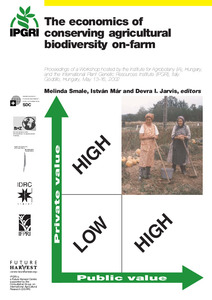The economics of conserving agricultural biodiversity on-farm: Proceedings of a Workshop hosted by the Institute for Agrobotany (IA), Hungary and the International Plant Genetic Resources Institute (IPGRI), Italy, Gödöllo, Hungary, May 13-16, 2002
Public policy-makers and scientists have expressed renewed interest in the prospects for on-farm conservation of crop genetic resources in recent years, but understanding of the economic incentives for and mechanisms through which programmes might best be implemented remains sketchy. Working through national partners, the goal of IPGRI's Global Project, 'Strengthening the Scientific Basis of in situ Conservation of Agricultural Biodiversity On-Farm' is to strengthen the scientific basis, institutional linkages and policies that support the role of farmers in conservation and use of crop genetic diversity through the application of sound theoretical principles in an interdisciplinary context. The current set of projects treats only crop biodiversity (livestock and aquatic biodiversity have not yet been included). The goal of the economics research will be to identify solutions, and the policies that support them, that promote the maintenance of diversity even as economies develop. This will be done through enhanced utilization of genetic resources by key actors-farmers who are consumers as well as breeders in their own right, professional plant breeders and scientists, and genebank managers. A winning solution is by definition one which meets a given conservation objective at least cost to society. To begin to identify this set of solutions for on-farm conservation, we need the empirical basis that provides the basis for comparative analyses of policy options. This brief report presents a summary of the methods papers presented followed by reports of ongoing and planned studies in India, Nepal, Mexico, Burkina Faso, Morocco and Hungary. Economist partners from Peru also attended. It is hoped that further development of these methods and their applications will allow empirically based comparisons that will inform policies in a way that is not currently possible. The proceedings updates the brief section on economics analysis included in the training manual by Jarvis et al. (2000), and also presents some previews of ongoing research.

